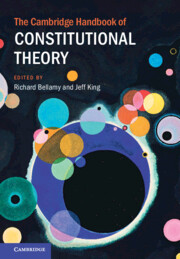Book contents
- The Cambridge Handbook of Constitutional Theory
- The Cambridge Handbook of Constitutional Theory
- Copyright page
- Contents
- Figures
- Contributors
- Frontispiece
- Preface and Acknowledgements
- 1 Introduction
- Part I Values
- 2 Human Dignity
- 3 Rights
- 4 Equality
- 5 Liberty
- 6 Well-Being
- 7 Self-Government
- 8 Justice
- 9 Recognition
- Part II Modalities
- Part III Institutions
- Part IV Challenges for Constitutional Democracy
- Bibliography
- Index
- References
6 - Well-Being
from Part I - Values
Published online by Cambridge University Press: 27 March 2025
- The Cambridge Handbook of Constitutional Theory
- The Cambridge Handbook of Constitutional Theory
- Copyright page
- Contents
- Figures
- Contributors
- Frontispiece
- Preface and Acknowledgements
- 1 Introduction
- Part I Values
- 2 Human Dignity
- 3 Rights
- 4 Equality
- 5 Liberty
- 6 Well-Being
- 7 Self-Government
- 8 Justice
- 9 Recognition
- Part II Modalities
- Part III Institutions
- Part IV Challenges for Constitutional Democracy
- Bibliography
- Index
- References
Summary
Good states want to increase the well-being of their citizens, and act to do this. Insofar as state efforts constrain action for the sake of well-being, however, there is a danger that these constraints will limit liberty in a way that actually undercuts the individual achievement of well-being. If we limit liberty in order to bring us to one desirable state (say, good health) that doesn’t necessarily increase well-being if the loss of liberty in itself diminishes well-being. However, when we consider the three major theories of well-being, hedonism, desire-satisfaction, and objective list theories, we see that there is nothing in the loss of liberty that necessarily diminishes well-being at all. It depends on what that loss brings about. Sometimes liberties make us better off, but it depends on the specific liberty and what it contributes. There is nothing about loss of liberty per se that does us any harm.
Keywords
- Type
- Chapter
- Information
- The Cambridge Handbook of Constitutional Theory , pp. 88 - 101Publisher: Cambridge University PressPrint publication year: 2025

